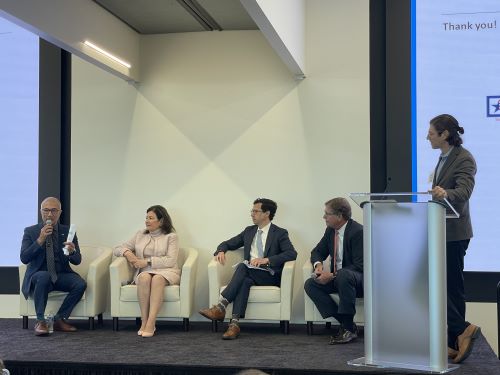A Smarter Plan for Immigrant Welfare
 The following article was co-written by David Bier.
The following article was co-written by David Bier.
The Trump administration recently unveiled a plan to prevent immigrants who the government predicts might be unable to support themselves financially from entering the country. But the proposal relies too much on guesswork. A bill introduced by Wisconsin Republican Glenn Grothman, which would allow immigrants into the country without giving them access to the welfare system, is a preferable alternative.
The Department of Homeland Security’s proposed regulation— the “public charge” rule—poses a major problem for legal immigrants. It would bar them from entry if a bureaucrat predicts that they might use some welfare here. But because the law makes them eligible for it, legal immigrants could always potentially use welfare at some point, even if they never have and never would. It may be difficult for many to convince the government otherwise.
If the administration’s goal is truly to prevent overuse of welfare benefits, however, Grothman’s bill provides a better strategy to support immigrant self-sufficiency and protect taxpayers. It bans access to all means-tested welfare and entitlement programs for immigrants until they become citizens. That means verified U.S. citizens could access federal welfare benefits like food stamps, Medicaid, and Medicare, but no noncitizens would be able to.
According to our estimates using data based on noncitizen use of welfare and entitlements in the Census Bureau’s Survey of Income and Program Participation, Grothman’s bill could save U.S. taxpayers about $60 billion in the first year that it takes effect (it provides a two-year grace period). Most rigorous estimates show that immigrants already pay more than enough in taxes to cover the cost of their benefits, but Grothman’s bill would end any debate over the fiscal impact of immigration by making it unambiguously positive.
Under Rep. Grothman’s bill, legal immigrants could continue to come to the United States to live and work as they do now. The only difference is that they will be totally barred from all welfare benefits and entitlement programs. Rather than building a virtual wall around the country to keep out legal immigrants—like the public charge rule would do—Grothman’s bill builds a virtual wall around the welfarestate.
His bill would expand a 1996 law that restricted federal welfare to only noncitizens who were eligible to become U.S. citizens after living here as a legal permanent resident for five years. The Grothman bill would take the next logical step by limiting all benefits only to those who actually go through the naturalization process and become U.S. citizens.
In addition to the $60 billion in savings, tax revenue would also increase as more noncitizens would work after losing their benefits. Harvard economist George Borjas found that after welfare reform in 1996 cut noncitizen access to welfare, immigrants worked so many more hours that their rates of poverty didn’t actually increase. Today’s booming economy provides exactly the right environment for noncitizens who lose benefits to make up the difference in the worker-hungry labor market.
Beyond the fiscal benefits, Americans would almost certainly be more supportive of legal immigration if they had certainty that immigrants were here solely to work and could not receive benefits. It would take away a major talking point for opponents of immigration. In fact, according to Gallup polling, Americans flipped from two-thirds in favor of cutting immigration in 1996 to a majority opposed to cuts shortly after welfare was restricted.
The new law would not remove eligibility for U.S. citizen children of noncitizens, in addition to immigrants who become U.S. citizens themselves. Naturalization, or the process of becoming a citizen, generally requires living legally in the United States as a legal permanent resident for at least 5 years, demonstrating basic knowledge of English, passing a test on U.S. history and civics, taking an oath of allegiance to the United States, passing a background check, and paying a $725 fee. If they pass, they would have access to all of the rights, responsibilities, duties, and benefits that Americans at birth do—including welfare.
Any immigrant who can’t meet those citizenship requirements would have to work or live on their own savings. If they fell on hard times and could no longer support themselves, they would need to rely on family, friends, private charities, or return to their home countries. This is how legal immigration worked for more than 150 years of American history, and it would work just as well today.
Restricting welfare is a smarter approach than the government’s public charge rule. Grothman’s bill will save taxpayers a boatload of money, and it would do it without losing the benefits that hardworking immigrants provide. With more self-reliant immigrants, America could open its doors to even more who want to contribute to this country.








